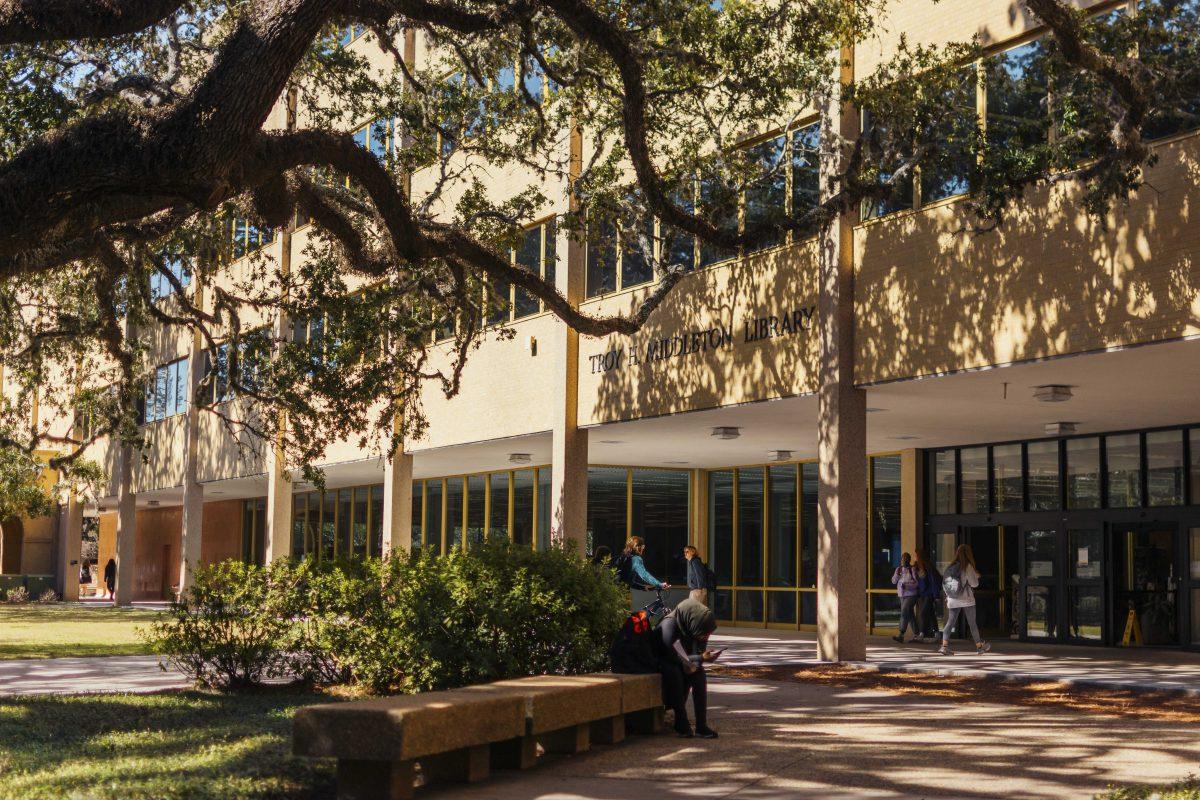The LSU Board of Supervisors met virtually via Zoom on Friday, June 19, to approve the resolution to remove Troy H. Middleton’s name from the University’s library.
University officials, students and friends of the Middleton family were able to give their stance on the matter. There were over 25 public comments sent to the board regarding the removal of Middleton’s name.
There is no update at the moment as to what the new name for the library will be.
As of early Friday afternoon, a crew had already assembled to remove the Middleton name sign.
Middleton, a former LSU President and World War I veteran, was a known segregationist.
In 1956, Middleton presented a formal report titled “LSU and Segregation” to the Board of Supervisors, six years after the first black student was admitted to the University. Middleton wanted to review “the Negro situation” the University was in.
“[The University] has [admitted black students] reluctantly, under court order,” Middleton said in the report. “While there are some 117 Negroes enrolled at LSU, the historic policy of the University is not to admit Negroes. It is unlikely that there will be any change in this policy.”
He also authored a letter to former University of Texas Chancellor Henry Ransom in 1961 saying that LSU aimed to maintain separation between white and Black students.
Gov. John Bel Edwards released a statement June 11 in support of the library’s name change.
“We cannot change what happened in the past, and this does not erase a history of racial injustice,” Edwards wrote. “But we can choose to no longer glorify a time of racial segregation or those who sought to discriminate against our African American brothers and sisters.”
Edwards commended the Black student leaders for their efforts to bring about this change. He also applauded University leaders for being open to their concerns.
“I am confident that we can come together as the diverse people that we are to confront inequality and become a more inclusive and just community,” Edwards wrote. “And I am heartened to see our tenacious young people leading the charge.”
Edwards was also present for the board meeting.
“In 2020 we value diversity,” Edwards said. “Diversity among our students, staff and faculty, and we want every student without exception to feel welcome, to feel valued and respected. We have to engage in that hard, uncomfortable conversation.”
Edwards acknowledged that the past cannot be changed, but there is still an ability to right wrongs and move forward.
“This is the opportunity to do just that and be on the right side of history,” Edwards said.
Middleton’s family criticized the University’s decision, citing Middleton’s military service and his contributions to the University.
Woody Jenkins, a friend of the Middleton family, spoke to the board in defense of Middleton.
“He instituted many changes and urged the governor himself to hire more black members to his staff and led the fight to integrate the state police,” Jenkins said.
Katrina Dunn, president of LSU alumni chapter, said she and the organization strongly supported the Middleton name removal. She also pointed out that the University’s first Black student, A.P. Tureaud, left the University after his first semester due to racist encounters.
According to Tureaud, Middleton “fought as hard as he could to keep me out of there.”
The petition to rename the library, made by LSU students Exquisite Williams, Kendall Diiulio and Calvin Morris, garnered over 13,000 signatures. It also expressed the students’ desire to see the library renamed after Pinkie Gordon Lane, who was the University’s first Black female Ph.D. graduate.
Many student leaders hope that renaming the library will be the first step in removing a number of racist symbols around campus. Another petition to rename 11 other buildings around campus named after segregationists, Confederate generals and Louisiana Governors with troubling voting records has earned over 3,000 signatures.
The decision comes 2 weeks after the University faced criticism for its response to an incoming student’s racist video.
West Monroe native Drew Dollar received attention after a video of him yelling racial slurs circulated on social media.
The University initial response on June 7 was met with criticism.
“To be clear, we at LSU condemn hate and bigotry in any form, including racially incendiary remarks. As a state university, however, we are subject to constitutional limitation on our ability to take action in response to free speech,” the original statement read.
On June 15, the University announced that Dollar would no longer be attending in the fall. The statement did not indicate whether Dollar’s admission was rescinded or if he resigned voluntarily.
On June 3, Interim President Tom Galligan stood with a group of peaceful protestors gathered in the Quad and publicly expressed his support for the Black Lives Matter movement.
“I pledge for as long as I am your interim president that I will work with you to do something about it, and the place to start is home,” Galligan said. “What can we do on our campus to make it a better place? What can we do to say we believe that Black lives matter? And why do we say that? Because Black lives matter. It’s a true statement, it’s a humanitarian statement.





